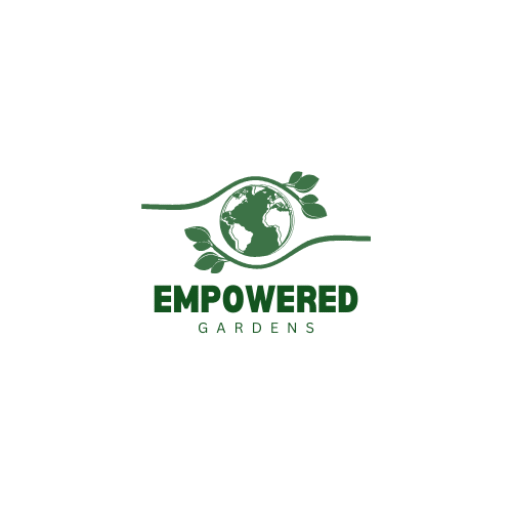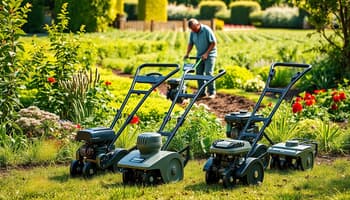Some of the links in this post are affiliate links, which means I may earn a small commission if you make a purchase through those links. This comes at no extra cost to you. Thank you for your support!
As a homeowner, I’ve often wondered if a tiller is worth the cost. With many options, deciding to buy or rent can be tough.
Garden tillers make preparing soil easier. They save time and effort. But, it’s key to consider the pros and cons before deciding.
In this article, I’ll look at the good and bad sides of using a tiller. Plus, I’ll share top picks for the best models out there.
Key Takeaways
- Understand the benefits and drawbacks of using a garden tiller.
- Learn how to choose between buying and renting a tiller.
- Discover the top-rated garden tillers available.
- Find out how to maintain your tiller for optimal performance.
- Get tips on how to use a tiller safely and effectively.
Understanding Garden Tillers and Their Purpose
A garden tiller is a strong tool for gardening. It breaks up and aerates the soil, making it ready for planting. Knowing how a garden tiller works can really help with preparing your soil.
What Is a Garden Tiller?
An electric tiller uses electricity to power its work. It has metal blades called tines that spin and mix the soil. This action loosens the soil and adds organic matter, making it better for plants.
How Garden Tillers Transform Your Soil
Garden tillers make your soil better by loosening and aerating it. This helps plants grow stronger roots and absorb water better. They also remove weeds and debris, making the soil ready for new plants.
These tools are especially good for gardens with heavy clay or sandy soils. They improve the soil’s texture and structure. Regular use of tillers can also prevent soil compaction, helping roots grow and improving drainage.
When You Need a Garden Tiller
Before you start tilling your garden, it’s key to know when it’s needed. A garden tiller is useful but should be used wisely to protect your soil.
Signs Your Garden Could Benefit from Tilling
If your garden has compacted soil, weeds, or debris, a tiller can help. It loosens the soil, improves drainage, and removes unwanted growth. It’s also useful for starting new garden beds or adding organic matter to your soil.
When to Avoid Using a Tiller
While a garden tiller is helpful, it’s not always the best choice. Landscape designer Ward Dilmore warns against over-tilling, as it harms soil organisms. If your soil is already loose and well-structured, tilling can harm it. Also, tilling can worsen erosion in gardens prone to it.
Choosing to use a garden tiller depends on your gardening needs. Knowing when to till and when to avoid it helps you use this tool effectively. This way, you can have a healthier, more productive garden.
Types of Garden Tillers Explained
Garden tillers come in different types, like front-tine, rear-tine, and mini-tillers. Knowing these differences helps you pick the best soil preparation tool for your garden.
Front-Tine Tillers
Front-tine tillers are light and easy to move around. They’re great for small gardens or tight spaces. They’re also cheaper and easy to store. But, they might not work well with hard soil or big areas.
Rear-Tine Tillers
Rear-tine tillers are stronger and better for big gardens or hard soil. They can dig deeper and handle different soils, like clay and rocky ones. They’re sturdy but can be heavy and hard to handle.
Cultivators and Mini-Tillers
Cultivators and mini-tillers are for smaller gardening jobs. They’re perfect for keeping garden beds in shape, mixing in fertilizers, or loosening soil. These small tools are light and simple to use, great for small gardens.
For more info on picking the right garden tiller, check out https://learn.compactappliance.com/tillers/. It has detailed guides and reviews.
| Tiller Type | Ideal Use | Key Features |
|---|---|---|
| Front-Tine | Smaller gardens, tight spaces | Lighter, easier to maneuver |
| Rear-Tine | Larger gardens, tough soil | More powerful, deeper tilling |
| Cultivators/Mini-Tillers | Small-scale gardening, maintenance | Compact, lightweight, easy to use |
Choosing the right tiller is crucial for a good gardening experience. “The right tiller can make all the difference in preparing your soil for planting,” says a seasoned gardener. “It’s worth taking the time to understand your options.”
Pros and Cons of Using Garden Tillers
Thinking about getting a garden tiller? It’s key to know the good and bad sides. Garden tillers can really help your garden look and feel better. But, they might not be for everyone.
Benefits of Using a Garden Tiller
One big plus of garden tillers is they improve soil quality. They break up hard soil and get rid of weeds. This lets air, water, and nutrients reach your plants’ roots better.
This can make your plants healthier and your harvest bigger. Plus, they save you time and effort. You won’t have to weed and prepare soil by hand as much.
Potential Drawbacks to Consider
But, there are downsides to garden tillers too. They can cost a lot to buy and keep up, especially top-of-the-line ones. They can also be loud and pollute, which might worry those who care about the environment.
Also, using them too much can hurt your soil and the tiny living things in it. So, use your tiller wisely.
By thinking about the good and bad, you can decide if a garden tiller is for you. If you do get one, pick one that fits your needs and budget. And remember to use and care for it right.
My In-Depth Garden Tiller Reviews
I’ve tested many garden tillers and I’m excited to share my findings. As a gardening enthusiast, I’ve evaluated several top models. I looked at their performance, features, and value. Here, I’ll share detailed reviews of four tillers that really stood out.
Mantis7940 4-Cycle Gas Powered Tiller
The Mantis7940 is a powerful, yet lightweight gas-powered rototiller. It’s perfect for gardeners tackling large areas or tough soil. Its 4-cycle engine offers reliable performance and is easy to maintain.
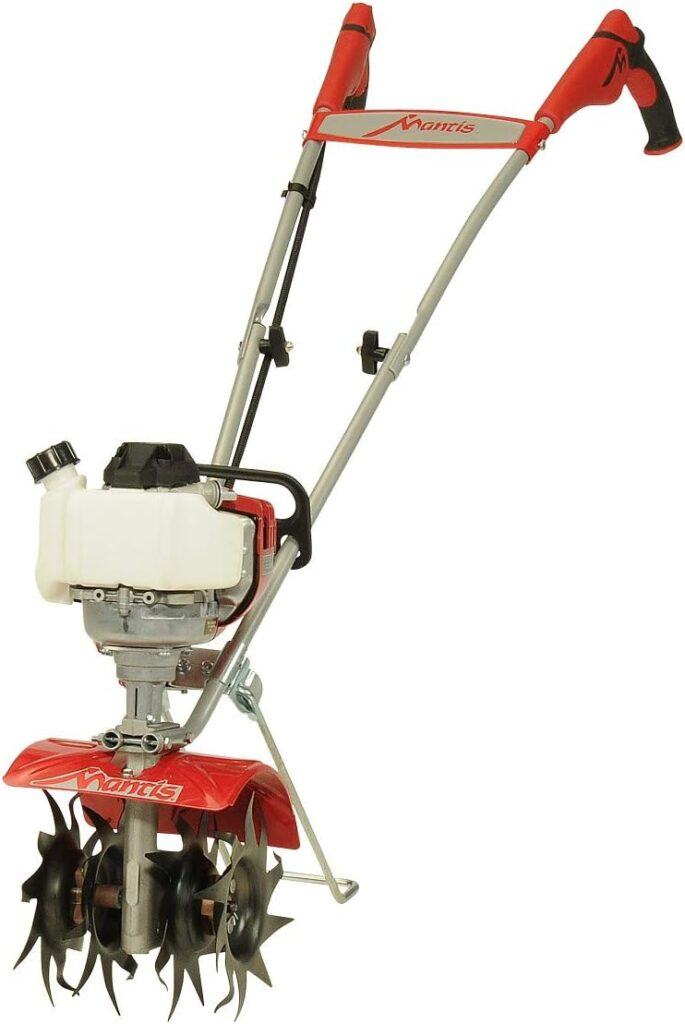
Pros
- Lightweight and maneuverable: Weighing just 45 pounds, this tiller is easy to handle and transport.
- Powerful performance: The 4-cycle engine delivers robust tilling capabilities, handling even the toughest soil with ease.
- Easy maintenance: The engine is designed for simple maintenance, with easy access to the oil and air filter.
Cons
- Noise level: As a gas-powered tiller, it can be quite loud, which may be a concern for gardeners who prefer quieter tools.
- Emissions: Gas-powered engines produce emissions, which may be a consideration for environmentally conscious gardeners.
| Feature | Description |
|---|---|
| Engine Type | 4-Cycle Gas Powered |
| Tilling Width | 9 inches |
| Tilling Depth | Up to 8 inches |
| Weight | 45 pounds |
Recommendations
I highly recommend the Mantis7940 for gardeners who need a powerful and reliable gas-powered tiller. For more information on other top-rated tillers, check out this resource from BHG.
Earthwise TC7000 11-Inch Electric Tiller
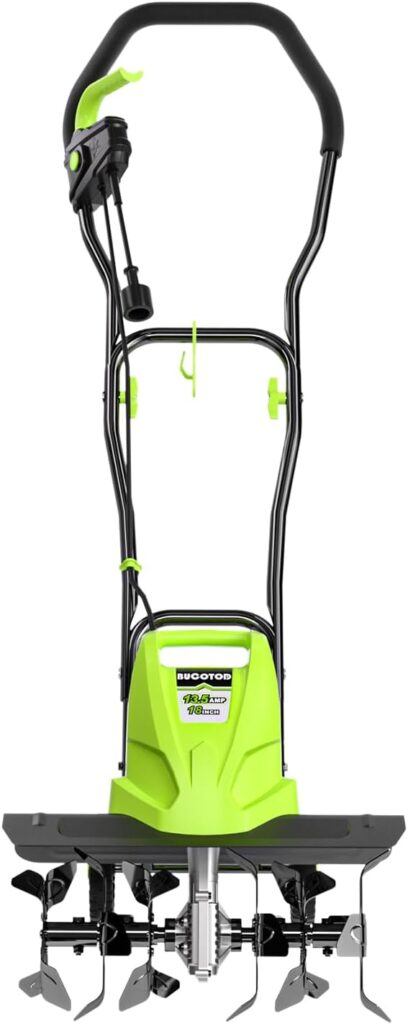
Overview
The Earthwise TC7000 is an electric tiller ideal for smaller gardens or those who prefer eco-friendly options. It’s lightweight, easy to use, and reliable.
Pros
- Environmentally friendly: As an electric tiller, it’s quieter and produces zero emissions.
- Lightweight: Weighing just 29 pounds, it’s easy to maneuver and store.
- Easy to use: The ergonomic design makes it comfortable to operate, even for extended periods.
Cons
- Limited power: Electric tillers generally have less power than gas-powered models, which may limit their effectiveness in tough soil.
- Cord length: The length of the cord may limit the area you can till without needing an extension cord.
| Feature | Description |
|---|---|
| Power Source | Electric |
| Tilling Width | 11 inches |
| Tilling Depth | Up to 7 inches |
| Weight | 29 pounds |
Recommendations
I recommend the Earthwise TC7000 for gardeners with smaller gardens or those who prefer an eco-friendly tiller. It’s a great option for soil preparation in smaller areas.
Sun Joe TJ603E 16-Inch Electric Tiller and Cultivator
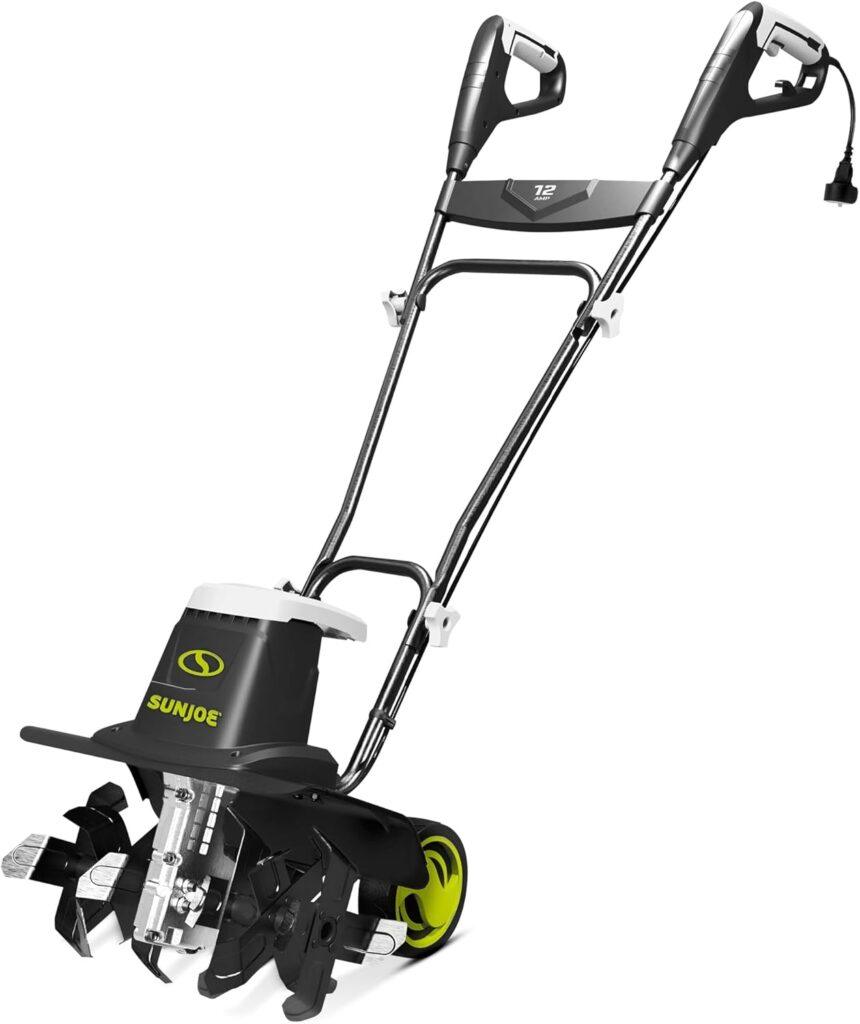
The Sun Joe TJ603E is a versatile electric tiller and cultivator. It’s perfect for various gardening tasks. It’s designed to be easy to use and reliable.
Pros
- Versatile: It can be used both as a tiller and a cultivator, making it a valuable addition to any gardening toolkit.
- Easy to assemble: The tiller comes mostly assembled, and the remaining parts are easy to attach.
- Adjustable depth: The tilling depth can be adjusted to suit different gardening needs.
Cons
- Limited heavy-duty capability: While it’s great for lighter tasks, it may struggle with very hard or compacted soil.
| Feature | Description |
|---|---|
| Tilling Width | 16 inches |
| Tilling Depth | Adjustable up to 7 inches |
| Weight | 22.5 pounds |
| Power Source | Electric |
Recommendations
I recommend the Sun Joe TJ603E for gardeners looking for a versatile and easy-to-use electric tiller and cultivator. It’s ideal for a variety of gardening tasks and is particularly suitable for lighter soils.
Honda FG110 Mini-Tiller Cultivator
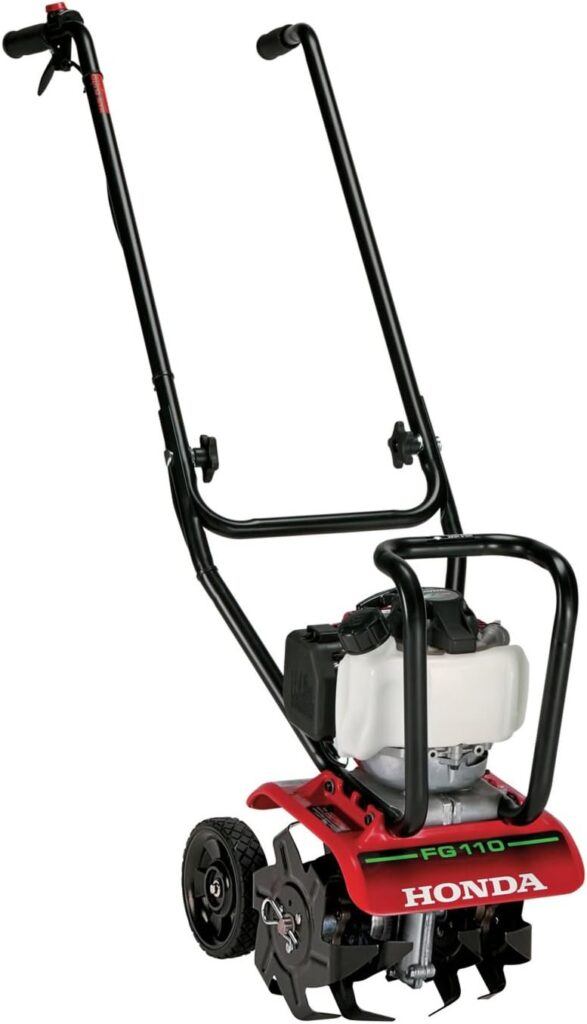
The Honda FG110 is a compact and lightweight mini-tiller cultivator. It’s designed for small gardens and tight spaces. It’s easy to handle and provides reliable performance.
Pros
- Compact design: Its small size makes it perfect for tight spaces and small gardens.
- Easy to handle: The ergonomic design and lightweight construction make it easy to maneuver.
- Reliable performance: Honda’s reputation for quality ensures that this tiller will provide consistent performance.
Cons
- Limited tilling capacity: As a mini-tiller, it’s designed for smaller areas and may not be suitable for larger gardens.
| Feature | Description |
|---|---|
| Engine Type | Gas |
| Tilling Width | 11 inches |
| Tilling Depth | Up to 10 inches |
| Weight | 53 pounds |
Recommendations
I recommend the Honda FG110 for gardeners with small gardens or tight spaces. It’s a great option for those who need a reliable and compact tiller.
Key Factors to Consider When Buying a Garden Tiller
When you’re looking to buy a garden tiller, there are a few important things to think about. The right tiller can really improve your gardening experience. It doesn’t matter if you’re new to gardening or have been doing it for years.
Garden Size and Soil Type
The size of your garden and the soil type are key factors. Larger, more powerful models are best for big gardens and hard, clay-heavy soil. For smaller gardens with softer soil, a less powerful tiller might be enough.
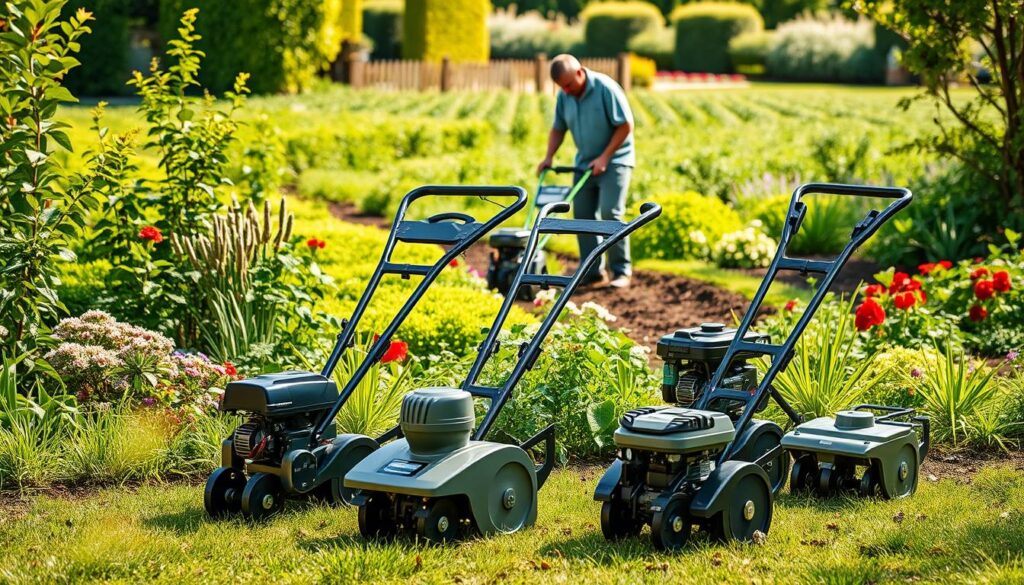
Power Source Options: Gas vs. Electric vs. Battery
Garden tillers come in different power sources: gas, electric, and battery. Gas-powered tillers have more power but need more upkeep. Electric tillers are lighter and easier to care for but might not handle tough soils well. Battery-powered tillers are convenient and easy to move around.
Tilling Width and Depth Capabilities
Think about how wide and deep you need your tiller to go. A wider and deeper tiller can cover more area and prepare the soil better. But, it will also be heavier and cost more.
Budget and Value Considerations
Your budget is a big deal. Look at what each model offers and its price to find the best deal. A pricier tiller might have more features or last longer. But, make sure it fits your needs and budget.
Maintaining Your Garden Tiller for Longevity
Keeping your garden tiller in good shape is key to its long life and performance. A well-maintained tiller will last longer and prepare your soil better for gardening. Here, we’ll look at important garden tiller maintenance tips.
Seasonal Maintenance Tips
To ensure your garden tiller stays in great condition, follow these seasonal tips:
- Check and replace worn-out tines at the start of each season.
- Clean the tiller after each use to prevent soil and debris buildup.
- For gas-powered models, change the oil regularly and check the air filter.
Electric tillers require less maintenance than gas-powered models, but it’s still important to check the cord and plug for damage.
Troubleshooting Common Issues
Common problems with garden tillers include starting issues, poor performance, and vibration. Always refer to your user manual for troubleshooting guides specific to your model.
Storage Best Practices
Proper storage is vital for keeping your garden tiller in good condition. Store it in a dry, protected area. Consider hanging it or storing it off the ground to prevent damage.
Alternatives to Garden Tillers for Soil Preparation
Garden tillers aren’t the only way to prepare soil. There are quieter, cheaper, and easier methods for gardening. These alternatives can help you get your soil ready without the hassle of tillers.
No-Till Gardening Methods
No-till gardening keeps the soil intact, saving its structure and ecosystem. It uses mulch and compost to boost soil health. This method cuts down on soil erosion and supports good microorganisms.
Manual Soil Preparation Tools
For small gardens, tools like broadforks, garden forks, and spades work well. They offer control and are great for beginners. These tools are less scary and more precise.
When to Consider Professional Services
For big areas or special soil needs, think about hiring pros. They bring the right tools and know-how to prepare your soil. This can save you time and effort.
| Method | Description | Suitability |
|---|---|---|
| No-Till Gardening | Minimal soil disturbance, mulching, and composting | Small to medium gardens |
| Manual Tools | Using broadforks, garden forks, and spades | Small gardens, beginners |
| Professional Services | Specialized equipment and expertise | Large areas, specific soil needs |
Conclusion: Is a Garden Tiller Right for You?
Choosing to buy a garden tiller depends on several things. These include the size of your garden and the type of soil. It’s important to think about what you need for your garden.
If your garden is big and the soil is hard, a tiller could be a good choice. I’ve looked at some top tillers, like the Mantis 7940 and the Earthwise TC7000. They have great benefits.
A tiller can make preparing soil easier. It can also save you from hard work and help plants grow well. By looking at what your garden needs and the best tillers out there, you can choose wisely.
